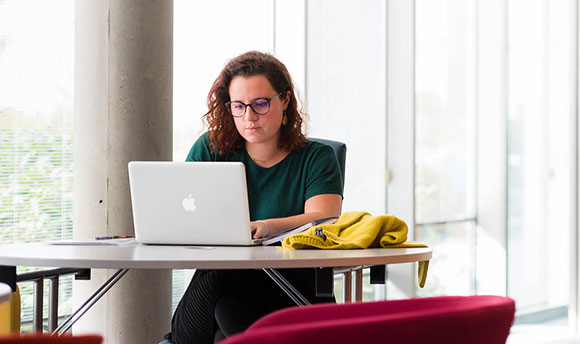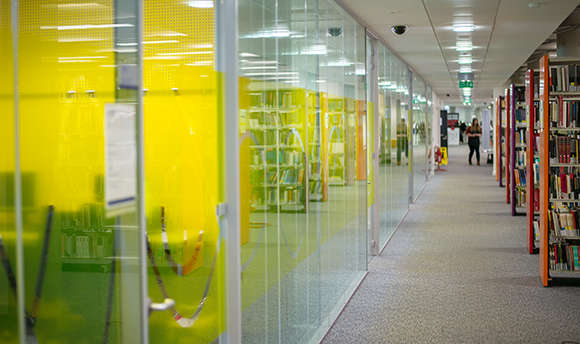Making the Most of Taught Sessions
Teaching at Queen Margaret is delivered in various ways, but all of them will involve some use of technology. The three main modes of teaching will be
- on-campus
- synchronous (real-time) online
- asynchronous (recorded) online
On campus
The sessions on campus are often for seminar groups, but. In seminars it is important that you take real responsibility for your own learning, and actively engage in the content of the seminars in order to make the most of the on-campus environment.
- Lecturers may post materials in advance on the Hub for use in the seminar - print these off and take them with you
- Work with the others in your room to share and exchange ideas to further your understanding of the seminar topic
- Use the opportunity of seeing your tutor to ask questions to clarify anything you are unsure of.
This is a real chance to interact with fellow students and your tutor – make the most of it.
Synchronous sessions
The synchronous sessions will be delivered online via Collaborate on the Hub (check out our guide to Collaborate). These sessions could take various forms, such as:
- PowerPoint presentations
- activities
- discussion groups.
The Hub allows for interactive sessions, but this is heavily dependent on student participation; go into these sessions ready and willing to participate. Although you will likely be joining them from the comfort of your own home, approach them more as though you were going into the University.
- give yourself time and space (somewhere quiet and on your own if possible)
- be ready to turn on your camera and join in activities and discussions.
On the Hub, there are various functions tutors may use to help facilitate an active session. How these are used will depend on the size of your group and the teaching style of your tutor. Some of the things you may experience are:
Breakout rooms
- When you join a Collaborate session, all participants are in the same ‘room’
- Breakout rooms is a function which allows your tutor to put you into smaller groups in a separate online space. This can encourage discussion because instead of speaking to 20 other students, you will be working with only 4 or 5. Stay focused on the topic when you are in the breakout rooms and work with the other students to complete the task you have been set.
Chat
- There is a chat function in Collaborate where you can type questions or comments at any time. Use this function sensibly – if you were in class you wouldn’t be able to ask questions constantly or whenever you wanted, so think about this before you type – too many questions or comments can be distracting for your tutor.
- Your tutor may turn off the chat function, or give you set times during the session to write in it so that they can manage the questions better and keep students focused.
Writing on the slides
- In Collaborate, it is possible to write on the slides being presented. Tutors may put questions on the slides and ask for students to type up their answers. If your tutor does encourage students to write on the slides, do it! It is a great way to try out ideas without feeling unsure of yourself as no-one knows who has written what – and, in this essentially ‘lifeless’ medium, it feels really good for the tutor (and your classmates) when the first signs of life appear on the slides!
Blank Whiteboard
- This is similar to writing on the slides. The tutor can put up a blank whiteboard for students to type on. Again, it is anonymous. Tutors may ask you to use a blank whiteboard when you are in the breakout rooms to record your group’s discussion.
Raise hand
- This is an icon you can click on if you want to speak during the session. Wait to be invited to speak after you have ‘raised your hand’.
Make sure you give yourself time to get ready for the synchronous sessions.
Think about how you are most comfortable working and make yourself a ‘workspace’ where you are best able to engage with the session for the full time it is on.
- Check that your internet connection is working and that you can use the mic and video on your laptop.
- Get all the materials you might need to access during the session
- print outs of any activities your lecturer posted for the session
- paper and pens/pencils to take notes
- highlighter pens and post-it-notes to note the most important points
- any books or journal articles you might want to refer to
- Have a glass of water in case you get thirsty.
And, remember, treat these sessions as though they were on campus, be fully present and engaged. It is easier for your mind to wander during one of these sessions than if you were in a seminar room, so you need to concentrate fully and participate as much as possible.
These sessions are as good as the students make them – help make yours great!
Asynchronous sessions
The asynchronous sessions will be mainly used for lectures. Lecturers are using Panopto (check out our guide to Panopto) to record their lectures and these recordings will then be put on the module Hub area for you to access at a time which suits. Remember that you should have watched the lecture prior to attending your seminar so make sure you put time aside each week for all of your lectures; timetable it into your schedule.
There are lots of good things about recorded lectures:
- you can go back to them and watch again if you think that would be useful
- Panopto has a chat area which you can add to and everyone sees as they watch the video - you can use this to ask questions or make comments.
- Panopto has a note function which allows you to take notes on the lecture. Only you can see these
- all of the lectures will have subtitles
- there is a search function which allows you to look for specific things in a lecture, or find a specific lecture where something was mentioned
- lectures may have quizzes in them which you need to complete before you can move to the next section. These can be useful to check your understanding
- you can re-watch certain sections of the lecture: you don’t need to watch the whole thing.
Although these sessions are recorded, it is important that you give yourself the full time needed for the lecture, so don’t just dip in and out. As with the synchronous sessions, get your workspace ready so that you can concentrate without too many distractions.
Make the most of the extra features available with a recorded lecture as they will help you, but be careful not to fall into the trap of not taking notes because you think that you can just go back and watch again. Notes are an important way of focusing your learning and are indispensable when it comes to writing assignments and revising (see the ELS guides on Making the Most of Online Lectures and Note Taking).
The Hub
All three types of sessions make use of the Hub, and so should you! HUB The Hub is where you need to go for all the information about your module:
- seminar topics
- seminar materials
- reading lists
- module handbook
- assignments
- links to online sessions
Make sure that you go through the Hub area for each of your modules and that you are familiar with the layout and the information given. Also check what extra features of the Hub are being used in your modules; lecturers may set up a discussion board for students to use, or they may ask that you submit seminar work through the Hub.
The Hub is your first stop to check what is happening in your module – use it!
Remember you can always ask for help. Your PAT is just an email away, as are your Programme Leader and Module Coordinators. Assist can help you with any of your tech. queries, so if something isn’t working with accessing University systems just drop them an email (assist@qmu.ac.uk). The ELS are available to support you in your academic work through 1:1 appointments – including on-campus, drop-ins and workshops – get more information on the ELS webpage, email us at els@qmu.ac.uk or elsinternational@qmu.ac.uk, or check out our bookable sessions on Student Central. PALS (Peer Assisted Learning Scheme) sessions run throughout semester – check out if we run session in your module on Student Central. The LRC offer sessions with their Liaison Librarians and workshops to help you use the library data bases – find out more on the LRC pages on the website.
If you need help – just ask!
ELS Support Enquiries
The ELS is based in room 1153 in the Library.
Opening hours:
Tuesday to Friday
09.15 a.m. - 16.15 p.m.



